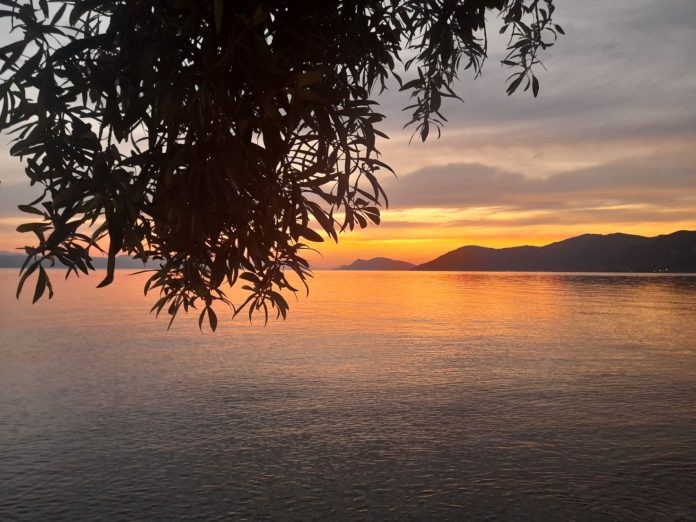

“1st Rovies Food Fest: Flavors with a Story to Tell”

Have you ever visited Rovies in Northern Evia? You should! Recently, the first Rovies Food Fest took place, a unique gastronomic celebration that showcased aspects of a lesser-known yet rich production and culinary tradition, blended with innovative activities, history, and the serene landscapes of Rovies in Northern Evia.
Visitors enjoyed unique experiences, which are now offered on a regular basis, making Rovies and the surrounding area a place every traveler should explore.
Treasures of the Evoikos Gulf
The Argonauta Diving Resort organized a dive into the rich seabed of the Evoikos Gulf, as well as a sea-to-table tasting experience after learning about the principles of marine sustainability and protection.
Right there on the shore, we prepared sea urchin salad and sea bass fillet carpaccio with local thyme, lemon, and olive oil. At the same time, at the new seaside restaurant Anemoia Evia, where the experience took place, delicacies from the Evoikos such as the famous crayfish and fresh fish were served.
The Cuisine of Poverty: Nettle Pie and Fried Bread of Rovies
In the seaside garden of Anemoia, we heard about the cuisine of poverty in the area: the meals of workers at the paper factory and the olive harvest, as well as the food of everyday life, always adapted to local conditions. So, in spring when eggs were plentiful, the table featured kourkouto, while from autumn onwards there was fried bread (tiganokouloura), presented by Mrs. Stavroula Georgiou Yiamali.
At the same time, the veteran cook Mrs. Vasiliki (Koula) Georgiou presented a forgotten recipe with Byzantine roots, symbolic of the social changes of the past century: nettle pie.
The Nectar of Northern Evia
FaMelaki by Gogos Passas and Nikos Afendras, together with beekeepers Vangelis and Panagiotis Dimou, Maria Argyriou, and Giorgos Palaiologos, guided us through the history of honey production in Northern Evia: from the time when producers from all over Greece came to the region, to the present day – after the wildfires but with new products.
We took part in a unique honey tasting of five distinct varieties: oak, pine, heather, anise-fennel (on its way to PDO status), and wildflower honey from blossoms that grew out of the ashes (as well as pollen from them). In the final part of the experience, we tried iced tea with two different honeys, discovering how each one changed the color and flavor of the infusion, and cut honeycomb that we tasted alongside local chilled tsipouro by the sunset at the restaurant Paralia Pine & Sea.
From Pasture to Plate – The Meats of Rovies
Butcher Vasilis Kyriakou (Karelas), a fourth-generation butcher, spoke about local meats from Rovies and the wider region and demonstrated meat cutting with the participation of the attendees. Along with the demonstration, we learned about the famous recipe for orange-scented sausage passed down through generations. Everything was grilled at the tavernas (Mylonas & Tachtsoglou) in Rovies’ main square and shared.
Olive Oil Tasting
Apostolos Doumas, a Greek merchant from Odessa, bought from the Ottomans a vast area of wild land around Rovies in Evia. This marked the beginning, in 1833, of the modern history of the Olive Grove. The land remained uncultivated until 1914, when 17-year-old Antonis Papadopoulos, descendant of Apostolos Doumas, took over. Son of Apostolos Papadopoulos and Anna Melas (sister of the well-known Macedonian fighter Pavlos Melas), Antonis was married to Alexandra, daughter of Stefanos and the national writer Penelope Delta.
“Forward, and only forward” was his motto. He built bridges, opened roads, constructed warehouses and tanks for water, olives, and oil. He studied the processing of green olives and began experiments to combat the olive fly. Remarkably, in 1959 he built the “Research Station” in Rovies, where agronomists worked year-round, and in the 1960s he began studying organic cultivation, which his descendants continue today.
At the estate of Stefanos Valli, a presentation was held on the factors that influence the quality of olive oil, such as the variety, soil, harvest time, as well as the mill and storage. There was also a tasting of three olive oils to recognize aroma, the intensity of bitter and spicy flavors, as well as any defects.
Main Event
And then came the day of the main event… The day when the stories nostalgically shared by older locals about past decades were brought back to life – times when neighborhoods and families gathered to eat together in nature. In the historic olive grove by the sea, a grand picnic was set up, with the active women of the Rovies Cultural Association sharing their favorite local recipes with the attendees: chickpeas with manestra, cheese pies, anchovies marinated in vinegar and salt, loukoumades with honey and pollen, among others. Guests who came with their own baskets also offered something of their own.
Everyone pitched in, and together we made a salad with whatever vegetables and fruits were in season, dressed with honey, extra virgin olive oil, and pomegranate vinegar (Stagones), along with olives from the Rovies Agricultural Cooperative.
The festival took place with the presence of seven distinguished media outlets, following an invitation from the Municipality of Mantoudi-Limni-Agia Anna and the Rovies Trade Association.













